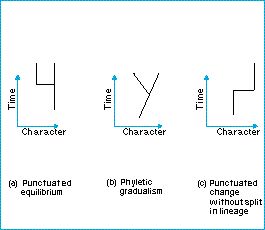Phyletic gradualism

Phyletic gradualism is a hypothesis about the pattern of evolution. In contrast to the theory of punctuated equilibrium, it states the following:
• Evolution has a fairly constant rate.
• New species arise by the gradual transformation of ancestral species.
• The rate of evolution during the origin of new species is much like that at any other time.
For gradualists, the fact that fossil evidence shows species suddenly appearing with little signs of any transitional forms is due to the incompleteness of the fossil record.
There is a historical controversy as to whether Darwin himself was committed to gradualism. It is most likely that he was a gradualist about the evolution of adaptations, not about the pattern of evolutionary rates.
The philosopher Daniel Dennett argues that evolution is a gradual process.
Figure: the crucial difference between punctuated equilibrium and phyletic gradualism concerns the rate at, and between, splitting events. (a) Punctuated equilibrium. (b) Phyletic gradualism. (c) Under a strict interpretation of punctuated equilibrium, sudden change without splitting contradicts the theory.
| Next |



